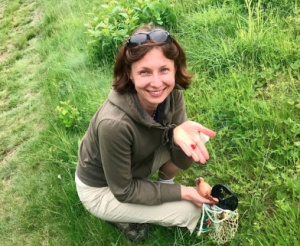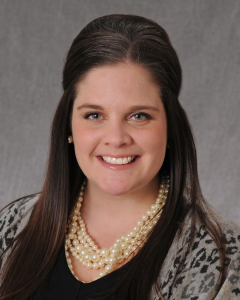They said “Flip” and we said “How high”? How technology is answering the call to remove all lectures
Spurred by a donation from a forward-thinking and tech-passionate alum, the University of Vermont Larner College of Medicine is removing all lectures and moving exclusively to active learning. This webinar will look at what it takes to extend a technology infrastructure (systems, rooms, learning tools) and support model to partner with our curriculum team to revolutionize how our faculty teach. This session will go into detail about how we are supporting the radical transformation of our integrated curriculum. It will discuss systems, application development, vendor management, staffing and, most importantly, a philosophy and ecosystem of education technology that has allowed us to pivot to support this sweeping reform.
The Role of Instructional Design in Health Science Course Development
In this webinar, UNE Online Instructional Designers will lead participants through their process of developing online courses for health sciences. The purpose of this session will be to demonstrate the value of the skills and experience of instructional designers for self-directed and active learning.
Using Social Media as an Educational Tool
Social media, collaborative web-based communication tools, can be used to engage learners and deliver educational content in novel ways. In this webinar, we present examples of social media use in health professions education as a springboard to explore the opportunities and challenges involved in designing and implementing social media educational innovations. Attention will be paid to supporting educational theory, issues of privacy, moderation, and outcome measures.
Virtual Reality and Augmented Reality in Medical Education
Recent advances in Virtual Reality and Augmented Reality technology now allow for the creation of realistic, highly immersive experiences for gaming, entertainment, and education at a fraction of the cost of earlier systems. In the past 24 months there has been a dramatic increase in hardware, software, and peripheral devices available for VR and AR experiences. The investment by Facebook of approximately $3 billion in Oculus to develop that platform is but one example of the race to develop VR systems for a wide variety of applications. The HTC Vive and Oculus Rift provide fully immersive desktop-class VR systems with controllers and peripherals that allow for individual tracking, multiplayer participation, and highly immersive simulations. As such, VR simulations which were previously restricted to very expensive systems in large simulation centers can now be created at significantly less cost and be accessible by a wider variety of organizations from K-12 classrooms, universities and medical schools. This presentation will review the emerging field of Virtual Reality and Augmented Reality in medical education and discuss the opportunities and challenges involved in realizing the potential of these technologies.
Realizing the Promise of Big Data: Learning Analytics in Competency-Based Medical Education
Learning analytics is “the measurement, collection, analysis, and reporting of data about learners and their contexts, for purposes of understanding and optimizing learning and the environment in which it occurs.” Competency based medical education in the 21st century will require educators be able to leverage analytics to promote individualized learning. This Webinar will introduce concepts and definitions associated with learning analytics, share examples from across the medical education continuum, discuss key considerations for implementation, and inform the audience about the future of learning analytics.
 Jill Jemison is Chief Information Officer for Health Sciences at the University of Vermont with responsibility for infrastructure, application development, support, educational technologies and AV at the Larner College of Medicine and the College of Nursing and Health Sciences. She is the technical leader for BTV Ignite, which promotes Burlington’s gigabit infrastructure in support of education, health care, economic development and public safety. She is past chair of the Association of American Medical Colleges Group on Information Resources and was founding chair of the GIR Education Technology Working Group. She joined UVM in 2002 to lead the creation of the hybrid E-learning portion of the college’s new integrated medical curriculum.
Jill Jemison is Chief Information Officer for Health Sciences at the University of Vermont with responsibility for infrastructure, application development, support, educational technologies and AV at the Larner College of Medicine and the College of Nursing and Health Sciences. She is the technical leader for BTV Ignite, which promotes Burlington’s gigabit infrastructure in support of education, health care, economic development and public safety. She is past chair of the Association of American Medical Colleges Group on Information Resources and was founding chair of the GIR Education Technology Working Group. She joined UVM in 2002 to lead the creation of the hybrid E-learning portion of the college’s new integrated medical curriculum. Chris Malmberg – Chris entered the field of Instructional Design 5 years ago after he finished his MA/MFA in Creative Writing and Literary Studies at the University of Alaska Fairbanks. While at UAF, he led multiple faculty development initiatives and produced a podcast on the intersection of technology and learning. At UNE, he facilitates professional development webinars and blog posts, and has developed curriculum for the Health Informatics, Public Health, Social Work and Applied Nutrition programs.
Chris Malmberg – Chris entered the field of Instructional Design 5 years ago after he finished his MA/MFA in Creative Writing and Literary Studies at the University of Alaska Fairbanks. While at UAF, he led multiple faculty development initiatives and produced a podcast on the intersection of technology and learning. At UNE, he facilitates professional development webinars and blog posts, and has developed curriculum for the Health Informatics, Public Health, Social Work and Applied Nutrition programs. Olga LaPlante – Olga LaPlante has worked for 20 years in various educational settings, from camp counselor and ESL instructor to university English as foreign language professor and French teacher to technology mentor in public schools and now instructional designer for higher ed. She grew up in Russia and received her equivalent Master’s degree in Teaching English as a Foreign Language with a minor in French. She also did additional graduate coursework in instructional technology and has taught in face-to-face classroom and online.
Olga LaPlante – Olga LaPlante has worked for 20 years in various educational settings, from camp counselor and ESL instructor to university English as foreign language professor and French teacher to technology mentor in public schools and now instructional designer for higher ed. She grew up in Russia and received her equivalent Master’s degree in Teaching English as a Foreign Language with a minor in French. She also did additional graduate coursework in instructional technology and has taught in face-to-face classroom and online. Wendy DiBrigida – After a rewarding 22 year career as an Occupational Therapist (OT), Wendy decided she wanted to pursue a Master’s degree that combined her passion for adult education and technology. Finding instructional design to be the perfect fit for the skills that she loved using as an OT and the skills she wanted to develop, Wendy graduated from Southern New Hampshire University with a Master of Science in Instructional Design and Technology in June, 2017. Completing the Master’s degree solely online developed a strong appreciation and excitement for online learning. Wendy joined the College of Graduate and Professional Studies in April, 2017 to pursue her passion for designing engaging, quality learning experiences for adult learners.
Wendy DiBrigida – After a rewarding 22 year career as an Occupational Therapist (OT), Wendy decided she wanted to pursue a Master’s degree that combined her passion for adult education and technology. Finding instructional design to be the perfect fit for the skills that she loved using as an OT and the skills she wanted to develop, Wendy graduated from Southern New Hampshire University with a Master of Science in Instructional Design and Technology in June, 2017. Completing the Master’s degree solely online developed a strong appreciation and excitement for online learning. Wendy joined the College of Graduate and Professional Studies in April, 2017 to pursue her passion for designing engaging, quality learning experiences for adult learners. David Bass-Clark graduated from Muhlenberg College with a Bachelor’s in Business Administration and Music, and went on to complete a Master’s of Science in Teaching and Learning in his home state of Maine. After working for Apple and Disney, and serving in the public school system as a technology integrator, he embarked on a four-year journey to live and work in China where he witnessed firsthand the impact of technology on a rapidly changing educational landscape. He is thrilled to join the UNE Online community as an Educational Technologist supporting the Instructional Design team.
David Bass-Clark graduated from Muhlenberg College with a Bachelor’s in Business Administration and Music, and went on to complete a Master’s of Science in Teaching and Learning in his home state of Maine. After working for Apple and Disney, and serving in the public school system as a technology integrator, he embarked on a four-year journey to live and work in China where he witnessed firsthand the impact of technology on a rapidly changing educational landscape. He is thrilled to join the UNE Online community as an Educational Technologist supporting the Instructional Design team. Dr. Katherine Chretien is assistant dean for student affairs and professor of medicine at George Washington University School of Medicine & Health Sciences and hospitalist physician at the Washington DC VA Medical Center. She is President-Elect of Clerkship Directors in Internal Medicine and on the executive leadership board of the Northeast Group on Student Affairs. Dr. Chretien is editor of the book “Mothers in Medicine: Career, Practice and Life Lessons Learned” (Springer, 2018) that is based on the group blog www.mothersinmedicine.com that she founded in 2008. Dr. Chretien’s area of research focus has been on social media use in medicine and has given numerous national workshops and invited talks on this topic.
Dr. Katherine Chretien is assistant dean for student affairs and professor of medicine at George Washington University School of Medicine & Health Sciences and hospitalist physician at the Washington DC VA Medical Center. She is President-Elect of Clerkship Directors in Internal Medicine and on the executive leadership board of the Northeast Group on Student Affairs. Dr. Chretien is editor of the book “Mothers in Medicine: Career, Practice and Life Lessons Learned” (Springer, 2018) that is based on the group blog www.mothersinmedicine.com that she founded in 2008. Dr. Chretien’s area of research focus has been on social media use in medicine and has given numerous national workshops and invited talks on this topic. Dr. Kirsten Brown (@DrKirtyBrown) is an Assistant Professor of Anatomy & Regenerative Biology and has been a faculty member since 2011. She received her PhD from the Johns Hopkins School of Medicine and Health Sciences in 2011, and her MEd from the George Washington University in 2018. Kirsten is the Director of Gross Anatomy, overseeing all of the anatomy-related educational programs for various student populations at the medical school. She teaches in the anatomical sciences, including human gross anatomy and neuroanatomy. Kirsten is medical education researcher and collaborates on numerous projects that involve analyzing student performance and learning in the anatomical sciences. She has published on a variety of anatomy education-focused topics, including several meta-analyses on anatomy pedagogies and on anatomy knowledge retention. Kirsten is a strong advocate for using social media to promoting one’s academic brand and engage with students. She recently gave a webinar, A Primer for Maximizing your Professional and Academic Footprint by Utilizing Social Media, for the American Association of Anatomists (AAA). She also serves as one of the Twitter correspondents for the AAA annual meetings. Her current research interest include the efficacy of social media-based instructional approaches (e.g., Instagram) in medical gross anatomy. Kirsten’s passion for medical education have not gone unnoticed by peers, colleagues, and students, as she is the past recipient of the Distinguished Teacher Award and two Golden Apple Teaching Awards.
Dr. Kirsten Brown (@DrKirtyBrown) is an Assistant Professor of Anatomy & Regenerative Biology and has been a faculty member since 2011. She received her PhD from the Johns Hopkins School of Medicine and Health Sciences in 2011, and her MEd from the George Washington University in 2018. Kirsten is the Director of Gross Anatomy, overseeing all of the anatomy-related educational programs for various student populations at the medical school. She teaches in the anatomical sciences, including human gross anatomy and neuroanatomy. Kirsten is medical education researcher and collaborates on numerous projects that involve analyzing student performance and learning in the anatomical sciences. She has published on a variety of anatomy education-focused topics, including several meta-analyses on anatomy pedagogies and on anatomy knowledge retention. Kirsten is a strong advocate for using social media to promoting one’s academic brand and engage with students. She recently gave a webinar, A Primer for Maximizing your Professional and Academic Footprint by Utilizing Social Media, for the American Association of Anatomists (AAA). She also serves as one of the Twitter correspondents for the AAA annual meetings. Her current research interest include the efficacy of social media-based instructional approaches (e.g., Instagram) in medical gross anatomy. Kirsten’s passion for medical education have not gone unnoticed by peers, colleagues, and students, as she is the past recipient of the Distinguished Teacher Award and two Golden Apple Teaching Awards. Douglas Danforth is an Associate Professor in the Department of Obstetrics and Gynecology at The Ohio State University College of Medicine. He has been involved in medical education for over 20 years at Ohio State and has served as Reproduction Block Leader and Program Director for the Independent Study Pathway and currently serves as the Academic Program Director for Part One (Med 1-2) of the undergraduate medical education curriculum. His primary research interests are in medical education using Virtual Patients and Virtual Reality (VR). Our Virtual Patients are controlled by artificial intelligence to enable students to practice their history taking skills using natural conversation, and the system is designed to provide immediate feedback to the students on their interaction. Our research in Virtual Reality is designed to improve patient safety using VR to train and assess emergency personnel responding to a mass casualty incident. These projects are funded by grants from the Department of Health and Human Services Health Resources and Services Administration, The National Science Foundation, The National Board of Medical Examiners, The Institute for Innovative Technologies in Medial Education, and the Agency for Health Care Research and Quality.
Douglas Danforth is an Associate Professor in the Department of Obstetrics and Gynecology at The Ohio State University College of Medicine. He has been involved in medical education for over 20 years at Ohio State and has served as Reproduction Block Leader and Program Director for the Independent Study Pathway and currently serves as the Academic Program Director for Part One (Med 1-2) of the undergraduate medical education curriculum. His primary research interests are in medical education using Virtual Patients and Virtual Reality (VR). Our Virtual Patients are controlled by artificial intelligence to enable students to practice their history taking skills using natural conversation, and the system is designed to provide immediate feedback to the students on their interaction. Our research in Virtual Reality is designed to improve patient safety using VR to train and assess emergency personnel responding to a mass casualty incident. These projects are funded by grants from the Department of Health and Human Services Health Resources and Services Administration, The National Science Foundation, The National Board of Medical Examiners, The Institute for Innovative Technologies in Medial Education, and the Agency for Health Care Research and Quality. Stanley J. Hamstra, PhD is currently Vice President, Milestone Research and Evaluation at the Accreditation Council for Graduate Medical Education (ACGME) in the USA. Dr. Hamstra is responsible for leadership and oversight of research in milestones and assessment systems for resident physician trainees. Dr. Hamstra works with medical subspecialty societies, program director organizations, and specialty certification boards to determine the best competency assessment systems for residency training programs. Prior to joining the ACGME, Dr. Hamstra held faculty positions at the University of Michigan, the University of Ottawa, and the University of Toronto Department of Surgery. He has also worked closely with the Royal College of Physicians and Surgeons of Canada to develop policies regarding competency-based medical education for graduate medical education. Dr. Hamstra received his PhD in sensory neuroscience from York University in Toronto in 1994.
Stanley J. Hamstra, PhD is currently Vice President, Milestone Research and Evaluation at the Accreditation Council for Graduate Medical Education (ACGME) in the USA. Dr. Hamstra is responsible for leadership and oversight of research in milestones and assessment systems for resident physician trainees. Dr. Hamstra works with medical subspecialty societies, program director organizations, and specialty certification boards to determine the best competency assessment systems for residency training programs. Prior to joining the ACGME, Dr. Hamstra held faculty positions at the University of Michigan, the University of Ottawa, and the University of Toronto Department of Surgery. He has also worked closely with the Royal College of Physicians and Surgeons of Canada to develop policies regarding competency-based medical education for graduate medical education. Dr. Hamstra received his PhD in sensory neuroscience from York University in Toronto in 1994.